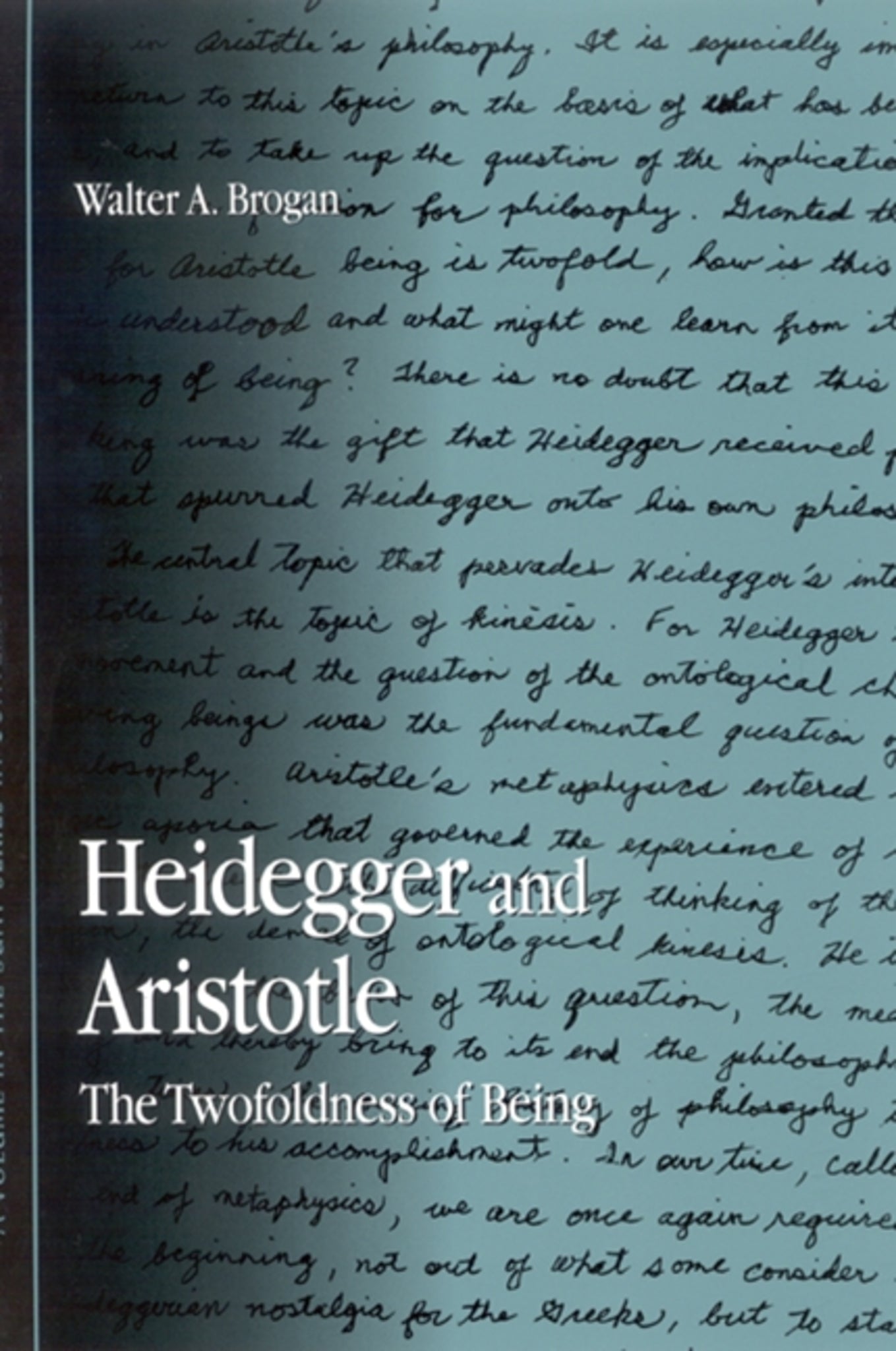We're sorry. An error has occurred
Please cancel or retry.
Heidegger and Aristotle

Some error occured while loading the Quick View. Please close the Quick View and try reloading the page.
Couldn't load pickup availability
- Format:
-
25 August 2005

Interprets Heidegger's phenomenological reading of Aristotle's philosophy.
Walter A. Brogan's long-awaited book exploring Heidegger's phenomenological reading of Aristotle's philosophy places particular emphasis on the Physics, Metaphysics, Ethics, and Rhetoric. Controversial and challenging, Heidegger and Aristotle claims that it is Heidegger's sustained thematic focus and insight that governs his overall reading of Aristotle, namely, that Aristotle, while attempting to remain faithful to the Parmenidean dictum regarding the oneness and unity of being, nevertheless thinks of being as twofold. Brogan offers a careful and detailed analysis of several of the most important of Heidegger's treatises on Aristotle, including his assertion that Aristotle's twofoldness of being has been ignored or misread in the traditional substance-oriented readings of Aristotle. This groundbreaking study contributes immensely to the scholarship of a growing community of ancient Greek scholars engaged in phenomenological approaches to the reading and understanding of Aristotle.


"The substantive and rigorous readings offered by Brogan—conveyed in exemplary philosophical prose, lucid and precise—clarify many murky aspects and unveil some unexpected and truly radical positions in the thinking of the early Heidegger's Aristotle. Indeed, Brogan's interpretation is careful, rich, and provocative." — Continental Philosophy Review
"This study provides a masterful exegesis of central texts in which Heidegger presents his reading of Aristotle's thought … Anyone seeking a thoughtful elaboration of Heidegger's positive reading of Aristotle's philosophy need look no further." — Ancient Philosophy
"…Brogan provides an especially clear exposition to parts of Heidegger's Aristotle interpretation. Any serious student of Heidegger should give this book careful scrutiny for the way in which it gives fresh meaning to core issues in Heidegger's understanding of phusis and technê, the ontological difference, Heidegger's understanding of the Greeks generally, and especially how Aristotle's ontology wrestles with the problems inherited from his predecessors." — Review of Metaphysics
"This is, by far, the most extensive study of the 'dialogue' between Heidegger and Aristotle, and one that will be consulted as the authoritative study on the topic. It takes giant steps to challenge the usual reading of Aristotle, and does so in a persuasive way, which partisans of the more traditional view will ignore only at their peril." — Drew A. Hyland, author of Questioning Platonism: Continental Interpretations of Plato
Acknowledgments
Preface
1. Martin Heidegger's Relationship to Aristotle
Heidegger's Phenomenological Reading of Aristotle
What It Means to Read Aristotle as a Phenomenologist
The Lost Manuscript: An Introduction to Heidegger's Interpretation of Aristotle
2. The Doubling of Phusis: Aristotle's View of Nature
The Meaning of Phusis
Heidegger's Ontological Interpretation of Movement in Aristotle's Philosophy
The Phenomenology of Seeing and the Recognition of Movement as the Being of Beings
The Meaning of Cause in Natural Beings: Heidegger's Rejection of Agent Causality
Ontological Movement and the Constancy of Beings
Phusis as the Granting of Place: Change and the Place of Beings
The Complex Relationship of Phusis and Techné
The Horizon for Understanding Phusis: The Meaning of Ousia
3. The Destructuring of the Tradition
Aristotle's Confrontation with Antiphon
Elemental Being (Stoicheia): Aristotle's Conception of Ontological Difference
The Meaning of Eternal (Aidion) and Its Relation to Limit (Peras)
The Necessity Belonging to Beings (Anangké) and the Possibility of Violence
The Law of Non-Contradiction
The Difference Between Being and Beings
The Method of Aristotle's Thought
The Path of Aristotle's Thought: The Twofoldness of Phusis
Aristotle's Hylomorphic Theory
The Way of Logos in the Discovery of Phusis
Genesis and Sterésis: The Negation at the Heart of Being
4. The Force of Being
Aristotle's Resolution of the Aporia of Early Greek Philosophy
The Rejection of the Categorial Sense of Being as the Framework for Understanding of Being as Force
The Non-Categorial Meaning of Logos in Connection with Being as Dunamis: Force in Relationship to Production
Aristotle's Confrontation with the Megarians: The Way of Being-Present of Force
The Connection Between Force and Perception: The Capability of Disclosing Beings as Such
5. Heidegger and Aristotle: An Ontology of Human Dasein
Dasein and the Question of Practical Life
Sein und Zeit and the Ethics of Aristotle
Plato's Dialectical Philosophy and Aristotle's Recovery of Nous: The Problem of Rhetoric and the Limits of Logos
The Ontological Status of Dialectic
Plato's Negative Account of Rhetoric in the Gorgias
Plato's Positive Account of Rhetoric in the Phaedrus
The Sophist Course: Aristotle's Recovery of Truth after Plato
The 1925-1926 Logik Course: Aristotle's Twofold Sense of Truth
Conclusion
Notes
Bibliography
Index



